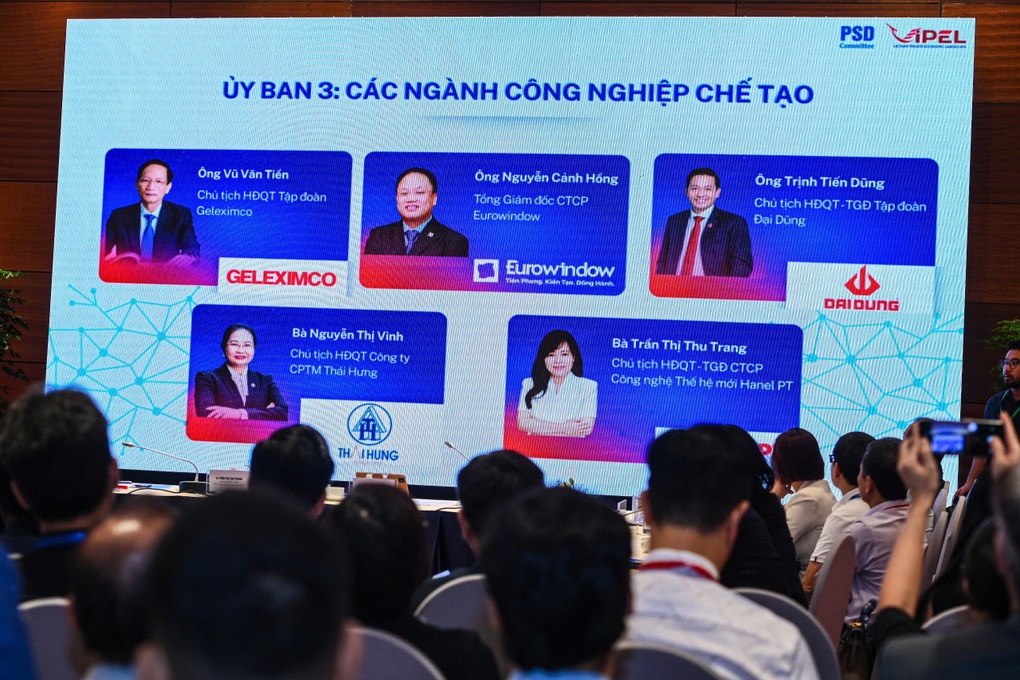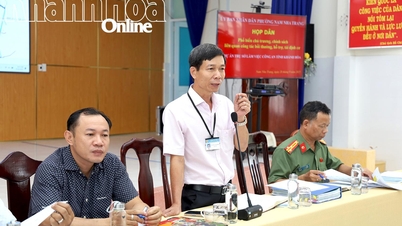Today (October 10), the first Panorama of the Private Economy (ViPEL 2025) opened in Hanoi with 4 dialogue sessions of specialized committees. The topics are spread across major industry groups and fields, from innovation, manufacturing and processing industry, finance, trade and services, etc.
At Committee 3, the dialogue session focused on the topic “Public-private mechanism in manufacturing industries”. In his opening speech, Mr. Trinh Tien Dung - Chairman of the Board of Directors and General Director of Dai Dung Group, who is also the chairman of the meeting - said that Committee 3 was established to provide strategic comments to the Party and Government , and at the same time create a forum for the business community to exchange, share experiences and propose solutions.
He emphasized that the working spirit of the Committee is to build, bring positive energy and propose specific solutions, towards the goal of "public-private co-creation". This means boldly building projects, forming leading enterprises to lead key industries, while creating conditions for small and medium enterprises to develop supporting industries. The long-term vision is to make Vietnam an industrial center in the region, contributing to promoting the country's economy.

Committee 3 focuses on the processing and manufacturing industry group (Photo: Hai Long).
According to Mr. Dung, Vietnam's manufacturing industry has developed rapidly in recent years, but the added value is still mainly concentrated in areas such as chemicals, electronics, and machinery. Meanwhile, many other industries such as transportation and trade have not yet fully exploited their potential. The manufacturing industry is also facing many new challenges: strict requirements on ESG and CBAM, dependence on FDI enterprises in exports, along with increasing growth pressure.
Vietnamese businesses are ready for a new phase.
Mr. Trinh Tien Dung - Chairman of the Board of Directors and General Director of Dai Dung Group - believes that with an increasingly large number of large, medium and small enterprises, Vietnam has enough influence to help the industry develop strongly in the future.
“In the era of national development, facing the trend of shifting supply chains and technological innovation, we are facing both challenges and great opportunities. Vietnamese enterprises are ready for a breakthrough period,” he emphasized.
In his speech, Mr. Dung proposed to form a network of domestic supporting manufacturers under the public-private partnership mechanism. Dai Dung's own story is proof: from a mechanical workshop with only 20 workers, this enterprise has grown to make its mark in many large-scale projects. Since 2015, Dai Dung has started to carry out projects abroad and has increasingly expanded its scale.
Mr. Trinh Tien Dung is currently known as the “steel dome boss” of Vietnam, as the enterprise he leads has provided 34,000 tons of steel for two 2022 World Cup stadiums in Qatar, as well as the world’s largest 24,000-ton steel dome at the National Exhibition and Fair Center (Dong Anh, Hanoi).

Mr. Trinh Tien Dung - Chairman of the Board of Directors and General Director of Dai Dung Group - talks about the challenges and opportunities of Vietnamese enterprises (Photo: BTC).
Mr. Dung analyzed that Vietnam's industry has many advantages such as transport infrastructure, deep-water seaports, a young workforce and opportunities to access modern technology.
However, the industry still faces many bottlenecks: lack of clean land for domestic enterprises, industrial park rental prices 2-3 times higher than in China, difficulties in accessing capital - especially for small and medium enterprises when converting to green - and lack of close links with schools and research institutes to train sustainable human resources.
To overcome this, he proposed developing specialized industrial parks for mechanics, integrating supporting ecosystems, automation and clean energy. According to him, large enterprises should lead, while small and medium enterprises play a supply role, together aiming to make Vietnam a pillar of industrial exports in the region. Specific solutions include improving institutions, expanding clean land funds, developing infrastructure, strengthening links between enterprises - institutes - schools and forming industry clusters.
"Money is important in business but the meaning of life is more important"
Ms. Tran Thi Thu Trang, Chairwoman of Hanel PT, shared about increasing the localization rate in the manufacturing industry through business alliances. “25 years ago, when many partners ordered components, we did not have them, but now I am very proud that I can provide them at good prices and guaranteed quality,” she said about her entrepreneurial journey.

Ms. Tran Thi Thu Trang, Chairwoman of the Board of Directors of Hanel PT, talks about the electronics business's 25-year-old startup journey and the story of developing the manufacturing and processing industry (Photo: Hai Long).
According to Ms. Trang, the big question for Vietnam in the next 10 years is: How to shift from outsourcing to processing and manufacturing, from “hiring” to mastering technology. In the context of the world restructuring the supply chain, this is an opportunity for Vietnam to assert its position.
“The manufacturing industry accounts for about 25% of GDP, but raw exports still account for 70-80%, while many countries have switched to semi-finished exports. In the past 9 months, electronics exports reached 33% of the country’s total turnover, but the domestic value is still very low,” she pointed out.
She believes that there is a lot of room for development, but the barrier lies in the mindset. The real value of the industry is not in “hired labor” but in R&D. However, Vietnam currently devotes too little to R&D. “It must be said that being hired labor is good, as long as it is done well; at the same time, we must develop domestic products, turning Vietnamese factories into Vietnamese inventors. Otherwise, we will always be at the top of the chain, with low added value,” she emphasized.
The solutions she proposed include: building domestic alliances, investing deeply in R&D, implementing new-generation PPPs in the spirit of “public-private partnership to build the nation”, the State opening a sandbox for testing, and at the same time, enterprises taking the lead in investing in innovation. In addition, it is necessary to have an open market mindset with links between supermarkets, exporters, processing and manufacturing enterprises and farmers in the same value chain.
“Money is important in business, but the meaning of life is more important. Vietnamese businesses are not weak, but we have not really grown stronger together,” she shared.
10 new values of Vietnam's private economic panorama
In the introductory report, Mr. Le Phung Thang - Chairman of the Board of Directors and General Director of Citicom Joint Stock Company, Vice President of Vietnam Mechanical Engineering Association, mentioned the background of ViPEL's establishment.
ViPEL was born in the urgency of the new period, from the need to build national capacity, opportunities from Resolution 68, core challenges as well as the urgency of needing a mechanism to realize the Party - State's policy of focusing on key areas such as infrastructure and strategic industry, breakthrough technology... with the determination to reform the public administration model...
ViPEL's 10 new values include new representatives, new thinking, new actions, new comprehensiveness, new continuity and regularity, new resource connection channels, new channels for recognizing and honoring dynamic localities, new channels for discovering and honoring typical enterprises, new and direct communication channels for Resolution 68. In particular, the new thinking is emphasized as the shift from "everyone does it alone" to "public and private co-creation".
Honoring national enterprises - national entrepreneurs - local development is one of the highlights of the model.
Source: https://dantri.com.vn/kinh-doanh/tu-gia-cong-den-lam-chu-con-duong-tat-yeu-cua-cong-nghiep-viet-20251010105211277.htm



![[Photo] "Exposing letters" in the flood center of Lang Son](https://vphoto.vietnam.vn/thumb/1200x675/vietnam/resource/IMAGE/2025/10/10/1760080117518_ndo_br_z7101324112737-07cd4d1c01801a8ccf4ae0cbaf31c4a3-507-jpg.webp)
![[Photo] Unique Phu Gia horse hat weaving craft](https://vphoto.vietnam.vn/thumb/1200x675/vietnam/resource/IMAGE/2025/10/10/1760084018320_ndo_br_01-jpg.webp)


![[Photo] Ho Chi Minh City is brilliant with flags and flowers on the eve of the 1st Party Congress, term 2025-2030](https://vphoto.vietnam.vn/thumb/1200x675/vietnam/resource/IMAGE/2025/10/10/1760102923219_ndo_br_thiet-ke-chua-co-ten-43-png.webp)

























































































Comment (0)